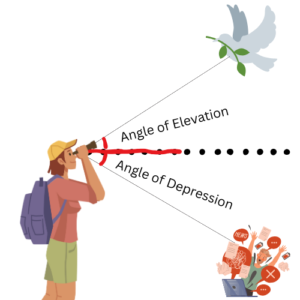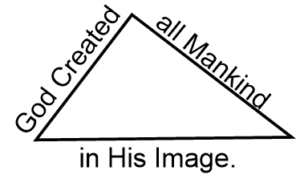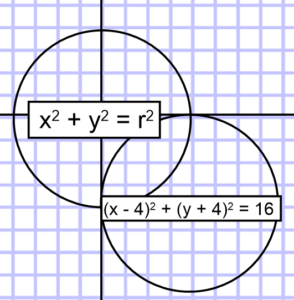
A Different Perpective


I have been actively working on Blogging and I decided to also post on this site. But it feels like a ghost town. I think on FB at least it gives me stats on the number of people who click on it and read my posts. So if I don’t get likes or comments as least I know that someone is reading it. Can you tell me if anyone is actually reading my posts?
Mary
“So God created mankind in His Own Image, in the Image of God He created them; male and female He created them.” Gensis 1:27
In a world often divided by differences, we tend to fear what is dissimilar to us. We engage in heated arguments with those who hold contrasting opinions, and we sometimes believe that there can be no connection with people who seem entirely unlike us. However, amidst this divisiveness, there is a powerful lesson we can learn from the humble scalene triangle.
The scalene triangle, a basic geometric shape, is unique in that it has no equal sides and no equal angles. Each side of the triangle stands alone, seemingly disconnected from the others, yet they all converge at a single point, forming a complete triangle. At first glance, these lines appear to be unrelated, but when they come together, they create a harmonious whole. In essence, the scalene triangle symbolizes the potential for connection among seemingly unconnected elements.

According to Christian belief, Jesus Christ, through His sacrifice on the cross, brings together disjointed lives and dysfunctional families to create something unique and beautiful, much like the scalene triangle. When Jesus gave His life for us, He tipped the scales, allowing us to approach God as His beloved children, We are all His Children.
In our own lives, we often feel disjointed, unequal, and seemingly random, just like the sides of a scalene triangle. But just as Jesus can transform our lives, He can also make connections with others that defy human understanding. He can use our unique qualities, experiences, and perspectives to bring people together for His Glory. Just as the scalene triangle’s sides, which have nothing in common, come together at a vertex to create a triangle, so too can individuals with diverse backgrounds and perspectives come together to achieve something greater for God.
So, the next time you encounter a scalene triangle, let it serve as a reminder of the remarkable power of connection. Just as these seemingly unrelated lines can form a triangle, so too can individuals from different walks of life find common ground and create unity. We must allow Jesus to heal the divisions in our lives and communities, transforming our disjointed existences and allowing Him to turn us into His Masterpiece.
“Trust in the Lord with all your heart and lean not on your own understanding; in all your ways submit to Him, and He will make your paths straight.” Proverbs 3:5 – 6
In the hustle and bustle of today’s world, it’s all too easy to find ourselves pulled in multiple directions, our attention fragmented by a constant stream of distractions. It’s as if we are constantly in search of our center, a point of balance that seems increasingly elusive. In the realm of mathematics, there’s a concept known as the parent graph, which serves as the foundation for various functions and equations. This parent graph is centered precisely at the origin of the graph, serving as its focal point. In our lives, just like in math, we need a center, that center is God.
Picture a simple circle on a graph with its center point at (0, 0). This circle is centered at the origin, undistracted by circumstances. But life is seldom as straightforward as mathematics. Distractions, challenges, and temptations continually enter our lives, shifting our center of focus away from where it should be: God. Our lives can easily be compared to that circle on the graph, where external factors pull our center of attention in different directions.

When our center shifts from God to worldly distractions, we start to feel adrift, lost in the chaos of life. The more we allow these distractions to consume us, the farther we drift from God. It’s a pattern familiar to many, as the pressures of daily life, ambitions, and desires lure us away from what truly matters.
But here’s the key: just as in mathematics, where we can recalibrate our graphs and equations to return them to the origin, God has the power to reset our focus and realign our lives with Him at the center. It’s a conscious choice to eliminate the distractions that have crept in and to reevaluate our priorities.
Returning to God as our central focus isn’t about ignoring our circumstances or situations. It’s about viewing them through a different lens, one that acknowledges His presence and guidance in our lives. When God is our center, we gain clarity of purpose, a sense of peace, and resilience in the face of life’s challenges. We become less swayed by the ever-changing currents of the world and more anchored in our faith.
The journey back to God as our focus is a personal and ongoing one. It involves regular self-examination, prayer, and reflection. It means making choices that prioritize our spiritual well-being and nurture our relationship with God. It’s about recognizing that the distractions and temptations of the world will always be there but understanding that we have the power to choose where we anchor our focus.
In a world filled with endless distractions, it’s crucial to pause and ask yourself: “Where is my focus?” Is it on the fleeting pleasures and worries of the world, or is it on something greater, something eternal? Much like recalibrating a graph to its origin, shifting our focus back to God can bring clarity, purpose, and a deep sense of fulfillment to our lives. It’s a choice worth making, for in God, we find our true center, our unwavering focal point amidst the chaos of life.